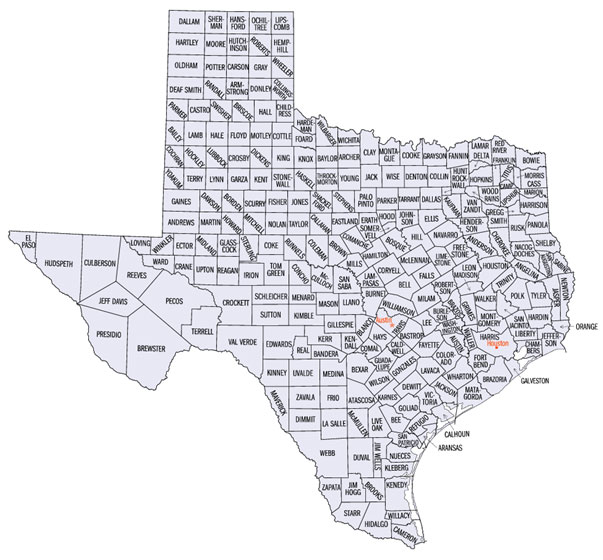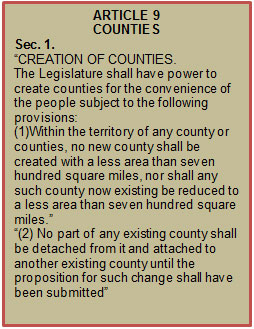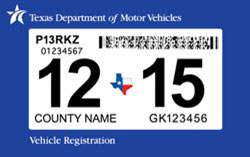
Source: Texas map, U.S. Census

Source: Texas map, U.S. Census
Take a look at the map above. It is divided into the counties of Texas. Each county has a county seat (main city) of government.
What is the county seat of Travis County? What is the county seat of Harris County?

There are 254 counties in Texas. Each county seat is usually the most populous city or town in the county. The Texas Constitution provides the creation of counties in Texas.

Counties serve a dual purpose in Texas. Each county serves to provide services for county residents while doing administrative work for the state. Important county services include health and human service programs. Counties in Texas also provide services such as libraries and parks for its residents.
According to the Texas Association of Counties, the main function of Texas counties is the following:
For the state, the county conducts voter registration and handles some elections. The counties also regulate the licensing and registration of motor vehicles.
![]() Watch the video below for an overview of counties in Texas, and then answer the following questions in your notes.
Watch the video below for an overview of counties in Texas, and then answer the following questions in your notes.
Source: County Government History and Overview, Texas Association of Counties, YouTube
Interactive popup. Assistance may be required.
The general function of Texas counties is to administer the state’s business locally. The state legislature expects the counties in Texas to implement its laws.
Interactive popup. Assistance may be required.
The counties initially served as a place where land titles, taxes, and birth and death records could be handled at a lower level.
Interactive popup. Assistance may be required.
County courthouses are important because they serve as a location for people to locate county services.
Every county in Texas is structured in the same way. The structure of county government is provided in the Texas Constitution. Each county is divided into at least four precincts and consists of the same elected officials.
County Officials in Texas |
|
Title |
Function |
| Commissioners' Court | Commissioners are elected from each of the four precincts. A county judge heads the court. The Commissioners' Courts oversee the general operations of the county. |
| Tax Office | Tax assessors-collectors assess and collect taxes owed in the county. The tax assessor-collector also registers voters and collects fees associated with the registration and licensing of motor vehicles. |
| County Clerk | County clerks record and keep the important records of the county courts. In some counties, the county clerk may also be responsible for conducting statewide elections. |
| Sheriff | Sheriffs are the main law enforcement officers in the county. The sheriff has various duties, including maintaining the peace and providing protection for county residents. |
| District Court | District courts consist of one or more counties. Depending upon the county, the district courts are divided into civil and criminal divisions. There are also courts that hear specialized cases. District clerks keep the records for the court documents of all district cases. |
| District Attorney | District attorneys represent the State of Texas in court cases throughout the county. District attorneys only work on behalf of the State of Texas and cannot practice law privately. |
| Justice of the Peace | Justices of the Peace preside over local court cases involving minor civil matters. |
Conducting the business of the county is expensive and requires revenue. There are several sources of revenue for counties of Texas.

Property taxes are levied on houses, buildings, land, and other types of property. Property taxes are also called ad valorem taxes, which means that the property is taxed based on the value of the property.

Source: Dec 15, Texas department of Motor Vehicles
Aside from property taxes, there are other various fees that generate revenue for counties. Fees for vehicle registration, marriage licenses, and birth certificate registration also generate revenue. Fines and fees resulting from arrests and court costs provide revenue for counties, as well.
The Commissioners' Court sets a budget that funds the various county departments. The budget is balanced between the revenue and the expenses of the county.